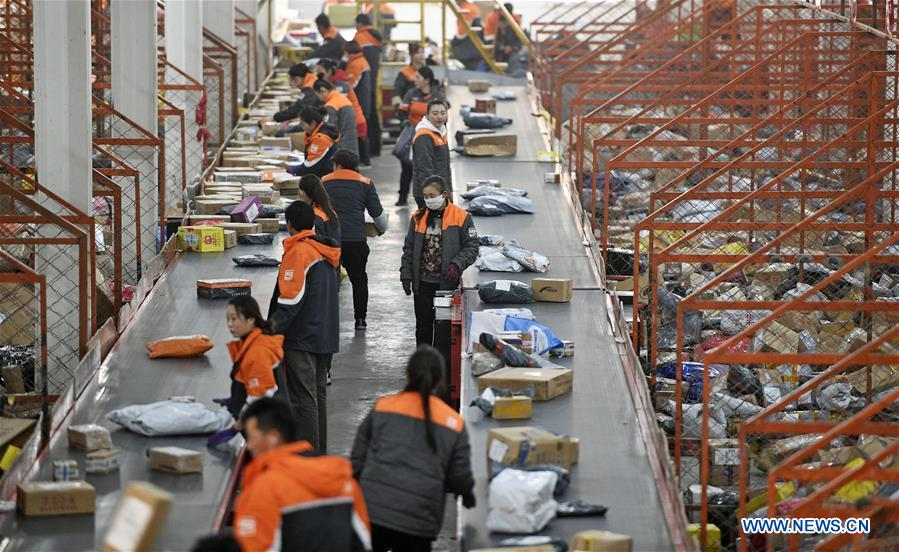02:53

"The future is digital" are words you might hear quite often but which are only now becoming a fact, thanks in part to the coronavirus pandemic.
From classes and lectures to Friday night happy hour, nearly everything and everyone is going online. While this might sound like the way to go in the future, it won't be a walk in the park for some businesses.
In fact, those that don't have the ability to shift online or go digital now probably won't survive after the crisis ends.
This was the overall message from the third online course on economics in the time of COVID-19, presented by Shen Jianguang, vice president of JD Group and a guest professor at Shanghai's Fudan University.
Shen began the lecture with some food for thought, saying "As long as we live in a globalized world, the whole world will be affected by the pandemic." In other words, what happens to one place affects everyone.
This could be seen clearly in China's own economic woes. Due to a decline in consumption, with retail in the first two months of the year dropping by 20 percent – a 15-percent drop in the first quarter – the country was already off to a rocky start. Even with a recovery of 15 percent in March, the drop spelled a shock in Chinese consumption.
To make matters worse, as the pandemic spread from China to the rest of the world, there has been a sharp decline in demand for Chinese products. This in turn has led to a drop in exports, which will only begin to have an affect on China's economy later in 2020.
One solution proposed by Shen was moving supply chains away from China in the near future, meaning the production of medical supplies and other goods would happen elsewhere. It's a move that could mitigate economic shocks.
While the government has mainly focused on SMEs and low-income households, another more far-reaching solution that the Chinese government has already undertaken is increased investment in the digital economy and digital tech.
With more services moving online – and those already online seeing a boom – this could spell great potential for consumer markets.

The distribution center of an express company in Yinchuan, northwest China's Ningxia Hui Autonomous Region, November 12, 2018. /Xinhua
The distribution center of an express company in Yinchuan, northwest China's Ningxia Hui Autonomous Region, November 12, 2018. /Xinhua
Shen's idea was echoed during the Q&A session by Sanuhan Hatipoglu, CEO of risk consultancy firm BERI, who noted that the structural changes taking place in the global economy need to be noted and adopted by small companies.
This is especially true in the move to digital platforms. While a quarter of China's sales are in e-commerce, it's only 10 percent in countries like the U.S. This disparity could help China in its recovery, but companies in other countries will need to follow suit in order to survive.
The biggest challenges, according to guest Prince Akinwale Ojomo, leader of the Nigerian Royal Cultural Exchange Program, are for SMEs. Yet, he is confident that the pandemic would create new opportunities for small businesses, especially for those looking to go online or go digital.
This sentiment was echoed by MD Nalapat, the vice-chair of Manipal University's Advanced Research Group, who said that technology in his own country, India, needed to be addressed.
While India has an advantage in skilled labor and its location – close to major Asian, European and African markets – during a pandemic businesses were still heavily affected.
One means by which Indians were adapting to the times could be seen in new practices undertaken by small farmers, who were conducting business by selling their products online over their phones. Nalapat also noted that people were using their phones to get price information and to keep up with the markets.
All in all, the guests and presenter agreed that the most important next step would be for global governments to embrace the winds of change. This would namely be in the form of new infrastructure, or digital infrastructure investment. China and some African countries were already exploring this route.
The sky is the limit with new tech and business opportunities generated in this unprecedented digital era. One question posed by an online course viewer was whether or not luxury goods would be negatively affected by the pandemic.
The overwhelming answer was that, while in the short term, people were turning to necessities instead of luxury items and leisurely pursuits, it is hoped this will eventually change. The change might not be immediate.
The only way for businesses to adapt to such a sporadic change is clear: going digital. In a post-pandemic world, everything will be different, but switching more to the digital world and web will allow companies – and the economy – to thrive.
By Vincent R. Vinci
(If you want to contribute and have specific expertise, please contact us at opinions@cgtn.com.)